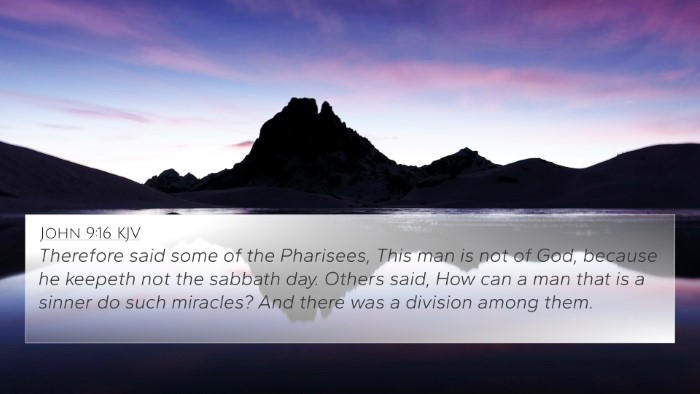Meaning and Interpretation of Mark 3:2
Verse Context:
In Mark 3:2, the verse states, “And they watched Him, whether He would heal him on the sabbath day; that they might accuse Him.” This scripture occurs within the narrative of Jesus' ministry, highlighting a critical moment where He confronts religious traditions and the heart of the law.
Overview of Commentaries:
- Matthew Henry: Matthew Henry emphasizes the scrutiny faced by Jesus from the Pharisees and the significance of their intent. He notes that their desire to accuse Him illustrates their hardened hearts and self-righteousness.
- Albert Barnes: Barnes focuses on the implications of healing on the Sabbath, indicating that the Pharisees cared more about their interpretations of the law than the well-being of individuals; this tension sets the stage for Jesus's teachings about mercy over ritual observance.
- Adam Clarke: Clarke notes the hypocrisy of the religious leaders in watching for Jesus to act rather than helping those in need. He highlights that their actions reflect a broader spiritual oversight that missed the essence of God's will.
Key Themes and Insights
This verse underscores several essential themes within Scripture:
- Legalism vs. Compassion: The religious leaders' fixation on the law illustrates how legalism can overshadow genuine compassion and humane treatment.
- Divine Authority: Jesus's ability to heal on the Sabbath challenges the traditional understanding of the law, asserting His authority as Lord over the Sabbath.
- Witness of the Heart: The action of watching and waiting by the Pharisees reveals a heart intent on judgment, contrasting with the heart Jesus calls for—one that seeks restoration and love.
Cross-References Related to Mark 3:2
To fully understand the multifaceted meanings of Mark 3:2, we can cross-reference several other verses:
- Exodus 20:8-11: This passage outlines the command to keep the Sabbath, providing foundational context for the ensuing conflict.
- Matthew 12:10-14: This account parallels the events in Mark, further emphasizing Jesus's stance on healing and the law.
- Luke 13:10-17: In this parallel story, Jesus heals a woman on the Sabbath, illustrating His approach to the law and compassion towards suffering.
- Galatians 5:22-23: The fruits of the Spirit contrast the behavior of the Pharisees by highlighting love, kindness, and compassion.
- Micah 6:8: This verse speaks to what God requires of His people—doing justice, loving mercy, and walking humbly, revealing the heart of God's law.
- John 5:16-18: Here, Jesus faces persecution for healing on the Sabbath, linking to the same tensions present in Mark 3:2.
- James 2:13: This verse reflects the principle of mercy triumphing over judgment, reinforcing the theme seen in Jesus’s actions and teachings.
Understanding the Implications
Mark 3:2 invites readers to reflect on their attitudes towards both divine law and human need. The scrutiny of Jesus challenges believers to consider how they view the scriptures and their applications in everyday life. It asks:
- Are we more concerned about maintaining traditions than helping others?
- How do we balance the letter of the law with the spirit of compassion?
- In what ways do we, intentionally or unintentionally, watch for the failings of others rather than their needs?
Conclusion
Mark 3:2 encapsulates a pivotal interaction showcasing the conflict between Jesus and the religious leaders of His time. The insights from public domain commentaries collectively illustrate the importance of understanding Scripture through a lens of mercy, compassion, and divine authority. By examining cross-references, readers can appreciate the interconnectedness of biblical texts, fostering a deeper understanding of God’s will and the spirit behind the law.
Further Study: Engaging in comparative Bible verse analysis is an invaluable tool for unlocking these themes. Utilizing a Bible cross-reference guide can aid in drawing parallels across scriptures while exploring the connections between Old and New Testament teachings.












